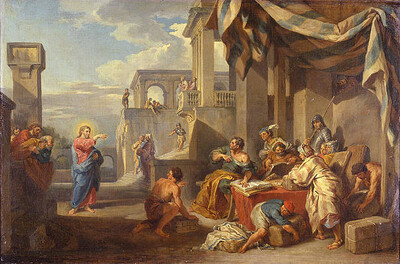Though Jesus was a devout Jew who practiced his faith, he was criticized for eating with tax collectors and sinners—the religiously nonobservant. Jesus criticizes the self-righteous and reminds us that mercy is to be at the heart of our religious practices. God continues to be made known in those on the margins of society, like Matthew the tax collector and the hemorrhaging woman. As we gather each Lord’s day we receive the healing that makes us well and sends us forth to be signs of God’s mercy for the world.
In this section of the Gospel of Matthew, Jesus responds to the demands of obedience conveyed in the Sermon on the Mount with divine power and mercy. Although this narrative of the call of Matthew led some readers to claim the tax collector as the evangelist, the book includes no internal evidence to suggest this. Rather, the tax collector exemplifies those who have not obeyed the law but who, like the members of the Matthean community, desire God’s mercy. The hemorrhaging woman also is saved by faith. Jesus, like the ancient prophets, can heal the sick and raise the dead—even, in this patriarchal society, women and girls.
Following Matthew’s call in Matthew 9, a group of religious folks express their disdain for Jesus’ inclusive table practices. He dines with “tax collectors and sinners,” expanding his circle of welcome far beyond the bounds of what was culturally expected or acceptable. This moment presents an opportunity to invite worshipers to think about their own practices of hospitality. Are our dinner guests primarily those who look and think just like we do? Do our social gatherings mirror the broad and inclusive welcome of Jesus?

